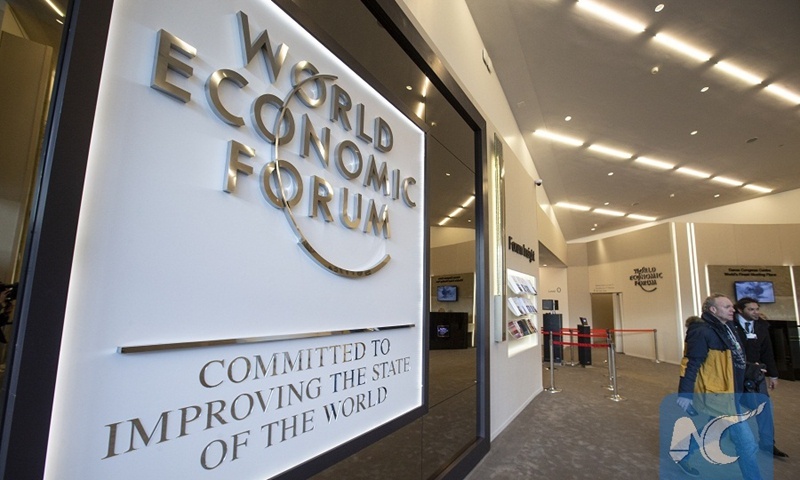
People walk by the logo of the World Economic Forum (WEF) in Davos, Switzerland, Jan. 21, 2019. The WEF Annual Meeting will kick off in Davos on Tuesday. (Xinhua/Xu Jinquan)
More than 2,000 leaders worldwide will join the World Economic Forum (WEF)'s virtual Davos Agenda event held from Monday to Friday.
The theme of the agenda for this year is "A Crucial Year to Rebuild Trust," and 25 heads of state and government will join to address urgent need for global cooperation, discussing economic, social and technological challenges in the context of the COVID-19 pandemic.
Chinese President Xi Jinping will participate in the Davos Agenda on Monday from Beijing via video link. It has been about four years since Xi addressed the opening session of the WEF annual meeting in 2017. "Whether you like it or not, the global economy is the big ocean that you cannot escape from," Xi said in his speech in 2017.
But currently, the trend of de-globalization is rising worldwide, with the possibility of an economic downturn increasing. This is neither in line with the general development trends of globalization, nor in China's interests. China attaches great importance to the WEF because the forum shares similarities with China's value judgments.
In this context, President Xi's speech has attracted much international attention. First, as world economy continues to seriously suffer during the COVID-19 pandemic, China is an important stabilizer and main driving force for global financial growth.
Besides, China has resumed production in an orderly manner amid its arduous COVID-19 fight to ensure that global industrial needs are properly met. This reflects China's strong governance capabilities and effectiveness in the country's overall system. It can be argued that the advantages of China's system are stimulating reforms and improvements to rules for global governance - inspiring faith in political management writ large.
China's 14th Five-Year Plan is further tackling problems by upholding innovation-driven development. It has shown the consistency of China's policies. This will help promote the steady development of the Chinese economy, and will make contributions to the future economic growth in Asia and the world.
This year's WEF will convene its special annual meeting for 2021 in Singapore from May 13-16. The importance of Asia in the global economy is obvious. This is not entirely due to the scales of Asian economies and their sustained economic growth. Another important reason pertains to the fact that Asian countries have relatively stable social orders.
Asian governments have played an important role in their economic stability and growth. This is also making people pay more attention to the region's social, cultural, and political factors while observing Asian economic development, particularly during the pandemic.
This should be another "highlight moment" for the success of Asian systems and culture in the long post-World War II era. In the context of the pandemic, it has been shown that Asia has relatively unique definitions of human rights protection, freedom and democracy as represented by China. The world will take a new look at the comprehensive influence of Asia for the foreseeable future.
The theme of this year's forum is "A Crucial Year to Rebuild Trust" and the theme last year was "Stakeholders for a Cohesive and Sustainable World." The difference shows the growing uncertainties the world is presently facing.
The retreat by some in the global order shows that the Davos meeting is shouldering a huge responsibility of global governance at this critical historical juncture. In this light, the thought of global governance proposed by China is being echoed across the world.
US President Joe Biden has reiterated that he will bring the US back to multilateralism and international cooperation. This is a somewhat positive signal. In the new administration, it might be a good opportunity for China and the US to engage in cooperation such as resetting global governance rules, and teaming up to fight the pandemic and climate change. Both should strive in this direction.
In particular, the US should be broad-minded. As President Xi said, the Pacific Ocean is vast enough to accommodate China and the US, as well as other countries. The new US president should think this over. The US as a whole, too, should be open to accept a peacefully rising China and work with it to improve global governance.
The author is a research fellow with the Institute of Political Sciences, Chinese Academy of Social Sciences.


